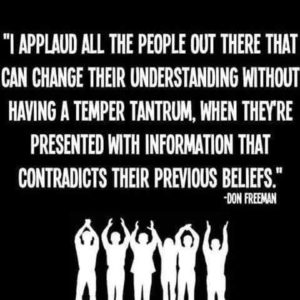Cognitive Dissonance

The term cognitive dissonance is used to describe the feeling of discomfort that results from holding two conflicting beliefs. It is experiencing an inner conflict denoted by an inconsistency between beliefs and behaviours – it is what can make us feel like a fraud.
Cognitive dissonance is a theory proposed by psychologist Leon Festinger who asserted:
people strive to achieve a sense of internal consistency by having their beliefs, attitudes, and behaviours align. Inconsistency of conflicting beliefs lead to disharmony and an aversive sense of mental tension – something must change in order to reduce the dissonance.
We have all experienced varying levels of cognitive dissonance. Cognitive dissonance can occur in many areas of life, but it is particularly evident in situations where an individual’s behaviour conflicts with beliefs that are integral to his or her self-identity.
What does this look like in everyday life?
- The person who believes they are scrupulously honest telling a lie
- The parent who believes their child is 100% incapable of any wrong-doing despite concrete evidence
- A person asserting that cigarette smoking is harmful to one’s lungs and respiratory health, but smoking marijuana does not pose similar risk
- The person who gets an abortion but believes abortion is immoral
- The person who cheats on a partner but believes infidelity is a sin
- A person being so opposed to one political figure that they blindly hold absolute faith that the integrity of the opposing political figure is beyond reproach (Hillary versus Trump comes to mind here…)
- Holding extreme beliefs around entire cultural/racial/ethnic demographics (ALL white people are materialistic or assert feelings of superiority, ALL Muslims are terrorists, ALL black people are criminals, ALL First Nations people are lazy, non-hetero sexual people have an “agenda”, et cetera)
Okay, you get the idea. The “weightiness” of dissonance a person experiences is dependent on several factors, such as how highly a belief is valued and the degree to which the beliefs are inconsistent. Elements of the dissonance can be influenced by the following factors:
- Cognitions that are more personal, such as beliefs about the self, tend to result in greater dissonance.
- The importance of the cognitions also plays a role. Things that involve beliefs that are highly valued typically result in stronger dissonance.
- The ratio between dissonant thoughts and consonant thoughts can also play a role in how strong the feelings of dissonance are.
- The greater the strength of the dissonance, the more pressure there is to relieve the feelings of discomfort.
It is easy to see that cognitive dissonance is alive and well: globally, societally, interpersonally, and within ourselves (internalized shame is a contributing factor to an inability to accepting unpleasant truths about ourselves -for more on mitigating shame, see here: https://blacksheepcounselling.com/2017/09/shame/).
How Can We Reduce Cognitive Dissonance?
- Take an inventory of your value and belief systems. It has been my experience that one of biggest contributing factors to cause us personal distress is when our actions and behaviours do not align with our value and belief systems. It is important to recognize that such belief systems change/grow/evolve over time based on new information (examples of that are how societally we now prioritize safety and sustainability in ways we might not have 20+ years ago).
- Assert openness and curiosity to examine supporting beliefs that outweigh the dissonant belief or behaviour. If new material or evidence becomes available that conflict your previous held belief, be willing to engage with this new information.
- Reduce the importance of conflicting belief. We are adept at justifying behaviour that we know conflicts with what we intuitively and intellectually know. An example of this is an individual who cares about physical health works at an office job where he/she spends large portions of the day sitting. This individual possesses awareness that a sedentary lifestyle is linked to diminished health and shortened lifespan. To contend with the feelings of discomfort, he/she might justify that drinking large quantities of water or taking vitamins make up for their predominantly inactive lifestyle.
- Change the conflicting belief so that it is consistent with other beliefs and behaviours. Changing the conflicting cognition is one of the most effective ways of dealing with dissonance. For more on challenging cognitive distortions, see here: https://blacksheepcounselling.com/2017/12/cognitive-distortions/
- Recognize that discomfort is part of the growth process. It is often uncomfortable to accept that you once believed something or in someone that you now deem repugnant. Rather than feel shame around this, I urge one to feel a sense of pride for having the courage to seek different perspectives and truths – this is a sign of emotional intelligence and maturity! – for more on this see: https://blacksheepcounselling.com/2017/07/emotional-intelligence/

- Choose to have a sense of humour about past errs in judgment and practice acceptance of Self. We are perfectly imperfect – a shared trait of our common humanity.
Conflicting beliefs can be held at the same time, often without one realizing it. I believe in the adage, when we know better, we do better. When we choose to become aware of phenomena like cognitive dissonance, we can use this as a tool for self-exploration and growth, contributing to our ability to journey to our preferred Self – sounds to me like a worthwhile belief to hold.

![]()
References:
https://www.investopedia.com/terms/c/cognitive-dissonance.asp?partner=asksa
https://www.simplypsychology.org/cognitive-dissonance.html
https://www.psychologytoday.com/us/basics/cognitive-dissonance
https://www.verywellmind.com/what-is-cognitive-dissonance-2795012
